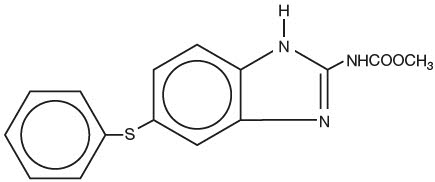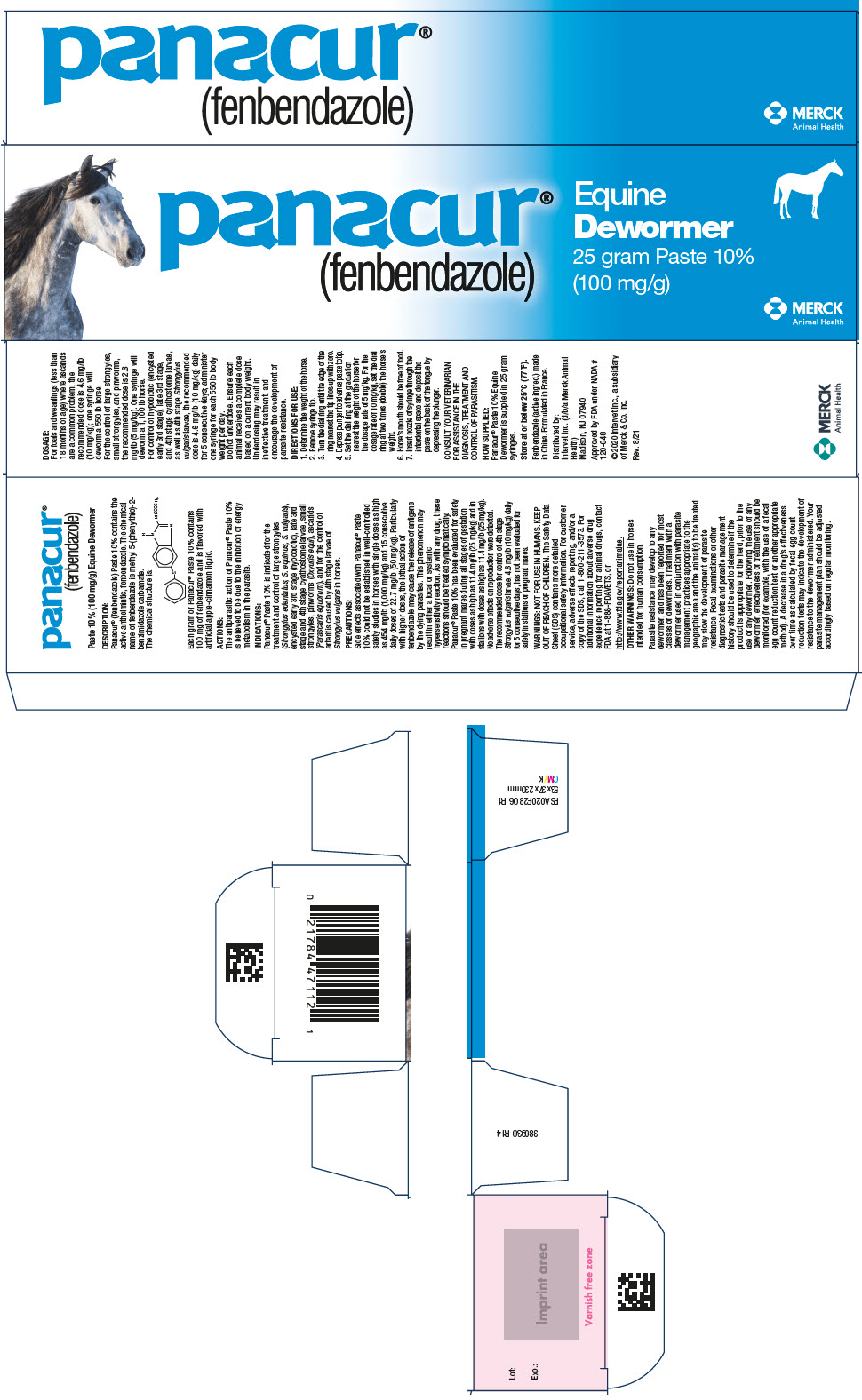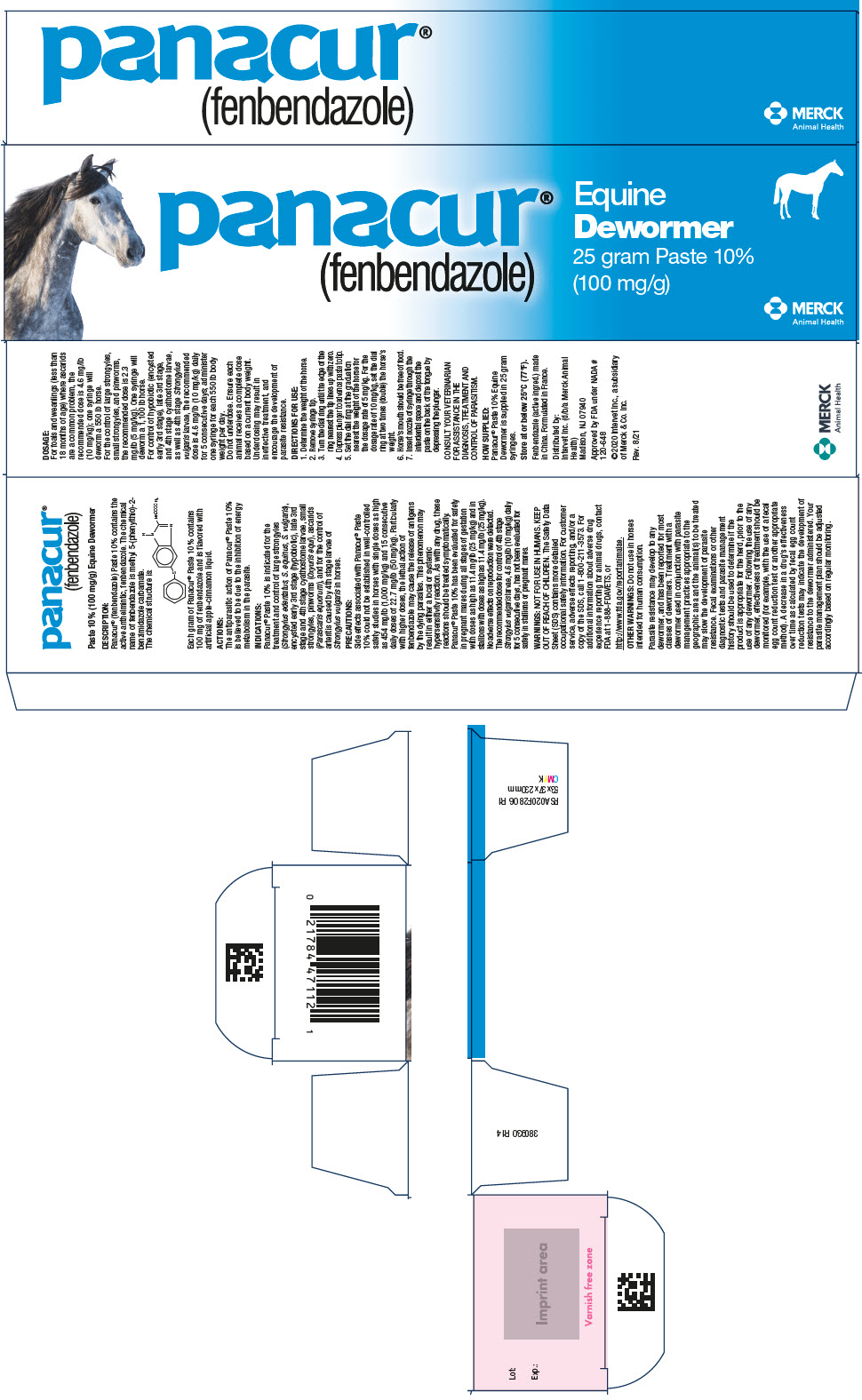Label: PANACUR- fenbendazole paste
- NDC Code(s): 57926-081-44, 57926-082-48
- Packager: Schering Corporation
- Category: OTC ANIMAL DRUG LABEL
- DEA Schedule: None
- Marketing Status: New Animal Drug Application
Drug Label Information
Updated November 7, 2024
If you are a consumer or patient please visit this version.
- Download DRUG LABEL INFO: PDF XML
- Official Label (Printer Friendly)
- SPL UNCLASSIFIED SECTION
-
DESCRIPTION:
Panacur® (fenbendazole) Paste 10% contains the active anthelmintic, fenbendazole. The chemical name of fenbendazole is methyl 5-(phenylthio)-2-benzimidazole carbamate.
The chemical structure is:

Each gram of Panacur® Paste 10% contains 100 mg of fenbendazole and is flavored with artificial apple-cinnamon liquid.
- ACTIONS:
-
INDICATIONS:
Panacur® Paste 10% is indicated for the treatment and control of large strongyles (Strongylus edentatus, S. equinus, S. vulgaris), encysted early 3rd stage (hypobiotic), late 3rd stage and 4th stage cyathostome larvae, small strongyles, pinworms (Oxyuris equi), ascarids (Parascaris equorum), and for the control of arteritis caused by 4th stage larvae of Strongylus vulgaris in horses.
-
PRECAUTIONS:
Side effects associated with Panacur® Paste 10% could not be established in well-controlled safety studies in horses with single doses as high as 454 mg/lb (1,000 mg/kg) and 15 consecutive daily doses of 22.7 mg/lb (50 mg/kg). Particularly with higher doses, the lethal action of fenbendazole may cause the release of antigens by the dying parasites. This phenomenon may result in either a local or systemic hypersensitivity reaction. As with any drug, these reactions should be treated symptomatically. Panacur® Paste 10% has been evaluated for safety in pregnant mares during all stages of gestation with doses as high as 11.4 mg/lb (25 mg/kg) and in stallions with doses as high as 11.4 mg/lb (25 mg/kg). No adverse effects on reproduction were detected. The recommended dose for control of 4th stage Strongylus vulgaris larvae, 4.6 mg/lb (10 mg/kg) daily for 5 consecutive days, has not been evaluated for safety in stallions or pregnant mares.
-
WARNINGS:
NOT FOR USE IN HUMANS. KEEP OUT OF REACH OF CHILDREN. The Safety Data Sheet (SDS) contains more detailed occupational safety information. For customer service, adverse effects reporting, and/or a copy of the SDS, call 1-800-211-3573. For additional information about adverse drug experience reporting for animal drugs, contact FDA at 1-888-FDAVETS, or http://www.fda.gov/reportanimalae.
-
FOOD SAFETY WARNING
OTHER WARNINGS: Do not use in horses intended for human consumption.
Parasite resistance may develop to any dewormer, and has been reported for most classes of dewormers. Treatment with a dewormer used in conjunction with parasite management practices appropriate to the geographic area and the animal(s) to be treated may slow the development of parasite resistance. Fecal examinations or other diagnostic tests and parasite management history should be used to determine if the product is appropriate for the herd, prior to the use of any dewormer. Following the use of any dewormer, effectiveness of treatment should be monitored (for example, with the use of a fecal egg count reduction test or another appropriate method). A decrease in a drug's effectiveness over time as calculated by fecal egg count reduction tests may indicate the development of resistance to the dewormer administered. Your parasite management plan should be adjusted accordingly based on regular monitoring.
-
DOSAGE:
For foals and weanlings (less than 18 months of age) where ascarids are a common problem, the recommended dose is 4.6 mg/lb (10 mg/kg); one syringe will deworm a 550 lb horse.
For the control of large strongyles, small strongyles, and pinworms, the recommended dose is 2.3 mg/lb (5 mg/kg). One syringe will deworm a 1,100 lb horse.
For control of hypobiotic (encysted early 3rd stage), late 3rd stage, and 4th stage cyathostome larvae, as well as 4th stage Strongylus vulgaris larvae, the recommended dose is 4.6 mg/lb (10 mg/kg) daily for 5 consecutive days; administer one syringe for each 550 Ib body weight per day.
Do not underdose. Ensure each animal receives a complete dose based on a current body weight. Underdosing may result in ineffective treatment, and encourage the development of parasite resistance.
-
DOSAGE & ADMINISTRATION
DOSAGE: Panacur® Paste 10% is administered orally at a rate of 2.3 mg/lb (5 mg/ kg) for the control of large strongyles, small strongyles, and pinworms. One syringe will deworm two 1,250 lb (568 kg) horses at a dose of 5 mg/kg. For foals and weanlings (less than 18 months of age) where ascarids are a common problem, the recommended dose is 4.6 mg/lb (10 mg/kg); one syringe will deworm a 1,250 lb horse.
For control of hypobiotic (encysted early 3rd stage), late 3rd stage, and 4th stage cyathostome larvae, as well as 4th stage Strongylus vulgaris larvae, the recommended dose is 4.6 mg/lb (10 mg/kg) daily for 5 consecutive days; administer one syringe for each 1,250 Ib body weight per day.
Do not underdose. Ensure each animal receives a complete dose based on a current body weight. Underdosing may result in ineffective treatment, and encourage the development of parasite resistance.
-
DIRECTIONS FOR USE:
- Determine the weight of the horse.
- Remove syringe tip.
- Turn the dial ring until the edge of the ring nearest the tip lines up with zero.
- Depress plunger to advance paste to tip.
- Set the dial ring at the graduation nearest the weight of the horse for the dosage rate of 5 mg/kg. For the dosage rate of 10 mg/kg, set the dial ring at two times (double) the horse's weight.
- Horse's mouth should be free of food.
- Insert nozzle of syringe through the interdental space and deposit the paste on the back of the tongue by depressing the plunger.
CONSULT YOUR VETERINARIAN FOR ASSISTANCE IN THE DIAGNOSIS, TREATMENT AND CONTROL OF PARASITISM.
- HOW SUPPLIED:
- HOW SUPPLIED
- SPL UNCLASSIFIED SECTION
- PRINCIPAL DISPLAY PANEL - 25 gram Syringe Carton
- PRINCIPAL DISPLAY PANEL - 57 gram Syringe Carton
-
INGREDIENTS AND APPEARANCE
PANACUR
fenbendazole pasteProduct Information Product Type OTC ANIMAL DRUG Item Code (Source) NDC:57926-081 Route of Administration ORAL Active Ingredient/Active Moiety Ingredient Name Basis of Strength Strength FENBENDAZOLE (UNII: 621BVT9M36) (FENBENDAZOLE - UNII:621BVT9M36) FENBENDAZOLE 100 mg in 1 g Product Characteristics Color Score Shape Size Flavor APPLE, CINNAMON Imprint Code Contains Packaging # Item Code Package Description Marketing Start Date Marketing End Date 1 NDC:57926-081-44 1 in 1 CARTON 1 25 g in 1 SYRINGE, PLASTIC Marketing Information Marketing Category Application Number or Monograph Citation Marketing Start Date Marketing End Date NADA NADA120648 05/10/2010 PANACUR
fenbendazole pasteProduct Information Product Type OTC ANIMAL DRUG Item Code (Source) NDC:57926-082 Route of Administration ORAL Active Ingredient/Active Moiety Ingredient Name Basis of Strength Strength FENBENDAZOLE (UNII: 621BVT9M36) (FENBENDAZOLE - UNII:621BVT9M36) FENBENDAZOLE 100 mg in 1 g Inactive Ingredients Ingredient Name Strength CARBOMER HOMOPOLYMER TYPE B (ALLYL PENTAERYTHRITOL CROSSLINKED) (UNII: HHT01ZNK31) PROPYLENE GLYCOL (UNII: 6DC9Q167V3) GLYCERIN (UNII: PDC6A3C0OX) SORBITOL (UNII: 506T60A25R) WATER (UNII: 059QF0KO0R) SODIUM HYDROXIDE (UNII: 55X04QC32I) METHYLPARABEN (UNII: A2I8C7HI9T) PROPYLPARABEN (UNII: Z8IX2SC1OH) Product Characteristics Color Score Shape Size Flavor APPLE, CINNAMON Imprint Code Contains Packaging # Item Code Package Description Marketing Start Date Marketing End Date 1 NDC:57926-082-48 1 in 1 CARTON 1 57 g in 1 SYRINGE, PLASTIC Marketing Information Marketing Category Application Number or Monograph Citation Marketing Start Date Marketing End Date NADA NADA120648 07/22/2011 Labeler - Schering Corporation (001317601)




